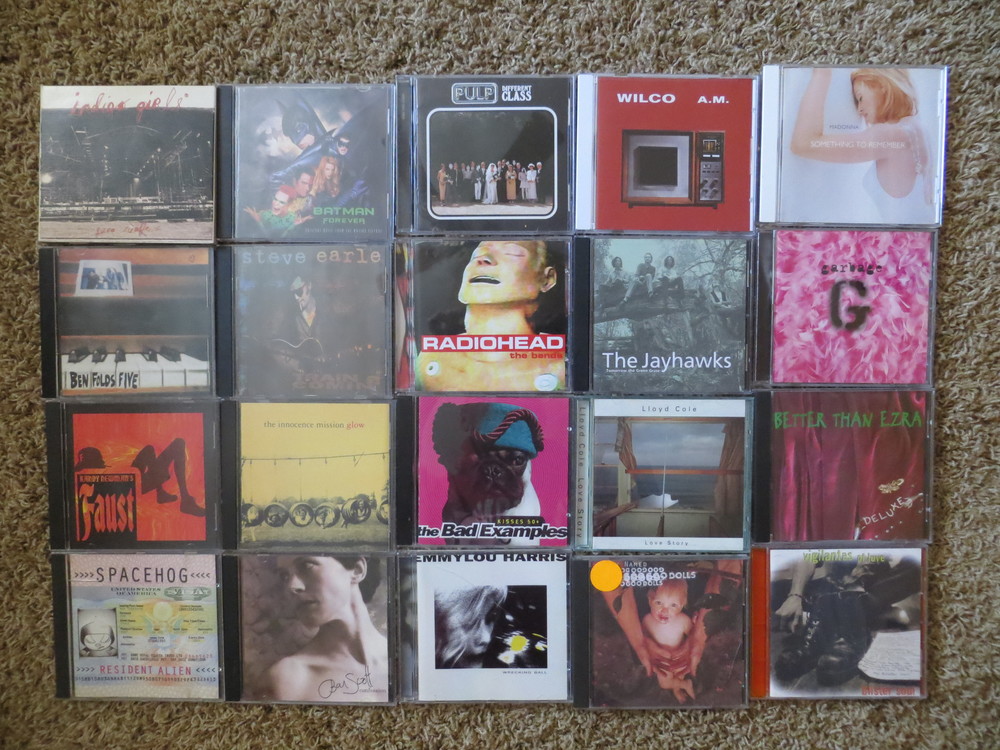The Music of 1995
Last month my friend Kevin summarized his feelings for the music of 1995. He wrote:
1995 music finally crushed me. Off with the makeup. Cut the hair. Get clothes in a color other than black. Trade in boots for loafers and quit Bartz's Party Store and start work at Fleet Mortgage/Washington Mutual for next 15 years. 95 didn't scare me straight, it frustrated me into society, and I owe it all to …… Coolio??
I decided it was my mission to prove him wrong, because my memories of the music of 1995 were quite positive, so I spent a month gathering music from this forgotten year. What I found in my own collection was enough to make a strong case, but I went out and gleaned another dozen or so bands to feature – some I’d never even heard of before – and then my friend John hopped onto the theme, making an even stronger case. Last Saturday, four of us got together in Wisconsin to do nothing but play and discuss music. Here’s what we came up with for 1995. For me, the first three albums along justify the entire year:
“High and Dry” and “Planet Telex” from The Bends – Radiohead
“Jackson Cannery” from Ben Folds Five – Ben Folds Five
“Common People” from Different Class – Pulp
“Honey White” from Yes – Morphine
“Universal Heartbeat” from Only Everything – Juliana Hatfield
“Downtown” from Mirror Ball – Neil Young
“Not My Idea” from Garbage – Garbage
“Summerland” from Sparkle and Fade – Everclear
“Hold Me, Thrill Me, Kiss Me, Kill Me” from Batman Forever Soundtrack – U2
“Somebody’s Crying” from Forever Blue – Chris Isaak
“You Could Make a Killing” from I’m With Stupid – Aimee Mann
“The Universal” from The Great Escape – Blur
"Just Like Anyone" from Let Your Dim Light Shine - Soul Asylum
“Don’t Look Back in Anger” from (What’s the Story) Morning Glory – Oasis
“Hometown Blues” from Train a Comin’ – Steve Earle
“Radio King” from Down by the old Mainstream – Golden Smog
“That Was Another Country” from Glow – Innocence Mission
“Sandman” and “A Happy Ending” from Faust – Randy Newman
“You Must Go” from Walk On – John Hiatt
“In the Meantime” from Resident Alien – Spacehog
“Brain Stew” from Insomniac – Green Day
“You’ll See” from Something to Remember – Madonna
“Blue” from Tomorrow the Green Grass – Jayhawks
“Awake” from Wholesale Meats and Fish – Letters to Cleo
“My Friends” from One Hot Minute – Red Hot Chili Peppers
“This is a Call” from Foo Fighters – Foo Fighters
“Loose String” from Trace – Sun Volt
“All I Really Want” from Jagged Little Pill – Alanis Morissette
“Every Poet Wants to Murder Shakespeare” from Kisses 50 Cents – Bad Examples
“In the Blood” from Deluxe – Better Than Ezra
“Casino Queen” from A.M. – Wilco
And that’s only what we had time for. There were many other band represented in 1995 that might have been worthy of our time: Big Country, Emmylou Harris, Smashing Pumpkins, Lloyd Cole, Graham Parker, Collective Soul, Del Amitri, Little Feat, Indigo Girls, Alice in Chains, Goo Goo Dolls, Dishwalla, Bruce Springsteen, Urge Overkill, Prince, Bar Scott, Semisonic, Vigilantes of Love, etc., not to mention jazz, hip-hop and other genres that we didn’t focus on but that undoubtedly had something to offer.
1995 may not have been perfect, but it surely had some terrific stuff. Sure, for some of these picks I happened to play the one really good song from an otherwise mediocre album. But you can’t tell me that when the oldies station plays “Happy Together” by The Turtles that you’re wishing the disc jockey had picked a deep cut. Sometimes the hit is what makes the album.
Then again, I’d put up Radiohead’s The Bends against any album of any year, and it would hold up very well.
So was Kevin persuaded to view the music of 1995 in a new light? Impressions are tough to overcome, but I think there may be a crack in the armor. Perhaps Kevin can post a comment below if he cares to interject.
